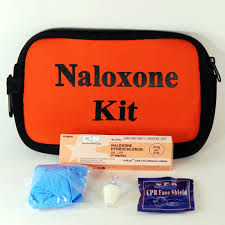
Within the last 5 years or so, accidental drug overdoses have replaced car accidents as the leading cause of death among adults in the U.S.
That means people are more likely to encounter an overdose victim who needs first aid assistance rather than someone who’s had a stroke, heart attack or been injured in a motor vehicle crash.
A group of community members gathered at the Henry F. Schricker Public Library Monday night to learn skills that could help them save a life.
The training course was run by Jes Cochran from the Indiana Recovery Alliance, a grassroots organization focused on implementing harm reduction interventions and maintaining respect and dignity for all participants.
She noted a handful of employees as well as a network of volunteers work to assist those recovering from addiction no matter what stage they’re in; from active users to those who are completely abstaining from all drugs and everyone in between.
They also provide communities with the resources and tools they need to provide support, play a role in recovery, and help prevent overdose deaths.
Those who attended Monday night’s training learned some of the warning signs of an opioid overdose, risk factors that increase the chance of one happening as well as ways to respond if someone is experiencing an overdose.
The two methods that were emphasized included rescue breathing and administering the overdose reversal drug naloxone.

While naloxone, sometimes referred to by its brand name Narcan, is able to counteract the drug’s effect, that’s not going to be immediate. This is why rescue breathing is a critical element of responding to an overdose.
According to the IRA, a physiological effect of an overdose is that it slows breathing to the point where the person stops getting enough oxygen to remain conscious.
It only takes 3-5 minutes for a lack of oxygen to start causing irreversible problems. Providing breathing assistance can help prevent brain damage and keep the person alive while waiting for Emergency Medical Services to arrive.
All emergency personnel, agencies that work with those in recovery and members of the community who need to be ready to respond if the situation arises should reach out to the Indiana Recovery Alliance in order to obtain naloxone kits and overdose response training and advice at no cost, judgment free.
Additional details from the presentation will be shared in future stories. For more information, visit IndianaRecoveryAlliance.org.






















